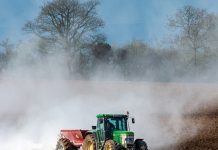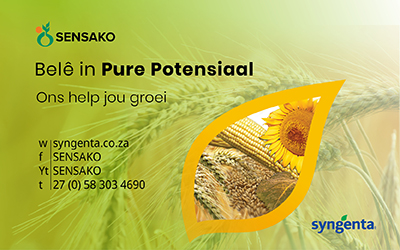
Global food security demands the development of new technologies and breeding techniques to develop improved crops that can increase and secure food production on finite arable land without increasing the use of resources. Crops should also be able to withstand environmental conditions as well as disease and pest pressure.
Taking these challenges into consideration, producers need to have access to a variety of improved seed choices to sustain food and fibre production.
Most of the plant-based foods we eat today are the result of generations of plant breeding. Agricultural research and plant breeding continue to open new opportunities in agricultural production. Advancements in plant genetics and genomics, when used in breeding, support increased production and cultivation of crops resistant to pests, pathogens, and other environmental conditions.
In general, breeding programmes focus on the development of varieties with improved yield, good agronomic adaptation to growing conditions, disease resistance and varieties that can respond to lower inputs. In addition, breeding programmes are also aimed at high-end use quality for the value chain and the consumer.
Research development
Since the discovery of the DNA helix, the understanding of plant DNA increased, and new techniques and methods were developed and used by breeders to create new plant varieties and hybrids in more efficient and precise ways than in the past. With the gene revolution, there have been significant developments in plant breeding and breeders started using biotechnology, marker-assisted and targeted breeding techniques to produce improved plant varieties with a view to sustainable food production, nature conservation and environmental protection.
In addition to the traditional breeding methods used to increase yield and certain quality traits in plants, molecular breeding methods have been used to achieve better and faster results. Because morphological, physiological, and cytological features are not entirely sufficient to determine a plant’s reaction to environmental factors, the trend towards using molecular breeding methods increased over the years. Using molecular markers, plant breeders have been able to discover relationships in the characteristics they wanted to breed into crops.
Recently, the international Demand-Led Breeding (DLB) working group together with the University of KwaZulu-Natal’s African Centre for Crop Improvement hosted a series of webinars for the research and development community in Southern Africa. The aim was to create a platform and consequent discussion forums to strengthen plant breeding in Southern Africa.
Eminent academics and research and development managers from across the globe attended these discussions and it was clear from all who attended – policymakers included – that the focus should be on demand-led and science-based breeding efforts.
To achieve these, as well as the United Nation’s sustainable development goals, and to increase agricultural productivity, it is important that researchers and plant breeders should be able to make use of all the toolsets available to them in order to provide the agricultural industry with improved genetics to address food production and environmental challenges.
It is imperative that policymakers and industry also support and encourage plant breeders to be innovative. Science-based policies are needed not only to regulate these new technologies, but also to enable everyone, including government, to seize the opportunities offered by these new developments in the plant breeding arena to ensure a nation with access to affordable and enough food.
There are a number of examples where limited access to new breeding techniques, a lack of funding and limited support for breeding programmes have had a major impact on the development of new and adapted plant varieties. One example is that of sunflower: The same breeding technologies and biotechnology that are available for maize and soybeans, are not available in sunflower breeding programmes. This can be seen as one of the fundamental reasons why yield and specific traits advantage are lacking behind in sunflowers. The future of the sunflower industry lies with breeders having access to and being able to use new breeding techniques.
Barriers placed in the path of breeders to employ the latest novel research and breeding techniques may ultimately lead to the stagnation of research and the development of new varieties and hybrids.
Regulation
In October 2021, the National Department of Agriculture, Land Reform and Rural Development (DALRRD) announced that a wide, varied and evolving group of products derived by new breeding technologies (NBTs) will be evaluated under the risk assessment framework that exists for genetically modified organisms (GMOs) under the Genetically Modified Organisms Act, 1997 (Act 15 of 1997, GMO Act).
This decision to regulate all products derived from NBTs as GMOs will have widespread implications, not only in South Africa and for South African innovators, but also with regard to international trade of commodities that may contain products derived by NBTs. Asymmetric regulation may cause food insecurity and significant barriers between trading partners.
Additionally, this decision will risk the ability of South African producers to access the latest innovative technologies that could further enable them to sustainably produce food with minimal environmental impact. It also denies consumers access to better and sustainably produced products.
The interpretation of the GMO definition goes against the widely accepted principle that NBTs should not be regulated differently if they are identical to, or indistinguishable from, products that could have been obtained naturally or through conventional breeding methods. This principle is upheld even in countries that use the living modified organisms (LMO) definition of the Cartagena Protocol on Biosafety, which are parties to the protocol like South Africa.
It is also important to consider that companies who wish to supply products derived from NBTs in South Africa, will have to incur added costs to access the South African market. At worst, international suppliers may bypass South Africa due to time delays and additional regulatory and registration costs. There is also a significant reputational risk for companies if their products are considered GMOs in South Africa, whilst the very same products are not deemed GMOs in the rest of the world. This may result in domestic value chains only having access to outdated technology.
Because it would be nearly impossible to ascertain or uniquely identify whether genetic changes have been created by conventional breeding, random mutation, or an approach considered to be an NBT, it would be difficult to classify and test new products. This will create challenges for the reliable enforcement of any possible asynchronous decisions among trading partners, as it is not likely that a comprehensive list of products in the global supply chain that have been developed using certain NBTs will be available.
Countries such as Brazil, Argentina, Israel, the USA, Japan, China and Nigeria (and with Kenya soon to follow), have adapted their regulations to exclude genomic edits that could have happened naturally from being regulated as GMO, such as targeted deletions.
A science-based regulation process for products derived from NBTs is needed to allow their safe and effective use and trade at a global level, but international regulatory alignment and compatibility must also be considered to enable and support locally developed products.
Novel techniques of plant breeding are ongoing and evolving continuously. Compelling all NBT applications to be regulated as GMOs will create unnecessary and costly barriers to enter the market. The implications of the decision will also discourage the development and uptake of the technology in the South African innovation and research space, including South African-owned seed companies, public sector research organisations and small to medium sized innovation enterprises.
A science-based approach on regulation of products derived by NBTs will not only benefit our producers, but will also positively affect the agricultural economy. South African research institutes and bio-innovators will be able to use these breeding techniques to breed varieties that are more adaptable and useful to local producers.
As agricultural challenges continue to grow in the face of climate change, increased pest and disease pressure, and a growing global population, it is imperative that innovative technology such as NBTs be part of the solution to help meet national commitments in terms of food security, climate mitigation and sustainability goals.
Over the years, South African producers managed to produce food and fibre of excellent quality and ample quantity for the local and export markets with the application of fertilisers, remedies and importantly, the availability of seed bred for local conditions. To ensure that South African producers continue to have the best seed available to them, plant breeders and researchers must have access to and be able
to use innovative breeding techniques. The various applications of NBTs constitute an essential tool for agricultural innovation in the future.
Argentine review
Argentina wrote a review on how products developed with NBTs that fall outside of the GMO scope, have broadened the developer profiles and included more local developers after five years of implementation. Applications of products received by the Argentinian regulators included more than 50% of crops, including cereals, oilseeds, and fibre crops. Graph 1 to Graph 4 illustrate these applications.
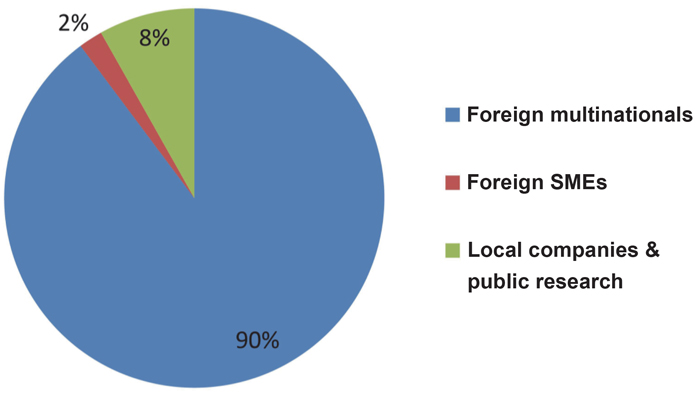
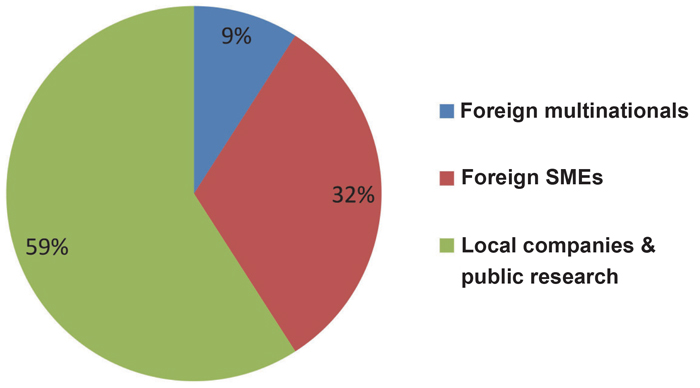
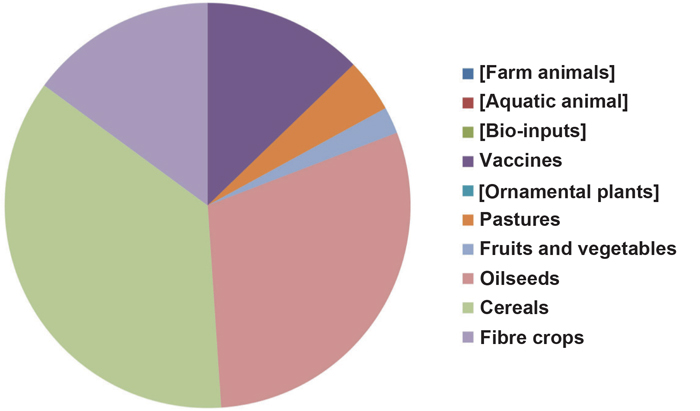
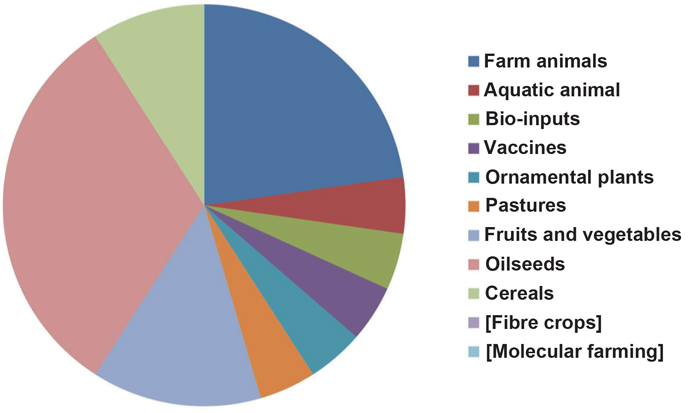
References
- Whelan AI, Gutti P & Lema MA. 2020. Gene Editing Regulation and Innovation Economics.
- www.frontiersin.org/articles/10.3389/fbioe.2020.00303/full.
What are NBTs?
New breeding techniques (NBTs) are innovative new methods used in research and breeding that enable scientists to improve and modify crops in a more precise manner. NBTs are tools that enable plant breeders to develop novel plant varieties that may provide solutions for environmental and food quality as well as food supply challenges. Researchers can enhance, silence, insert or remove desired traits by using NBTs. NBTs allow the plant breeding industry to produce plant varieties in a similar – but more precise – manner compared to conventional breeding techniques, in a significantly shorter timeframe. Click on the QR codes for more information on NBTs.










